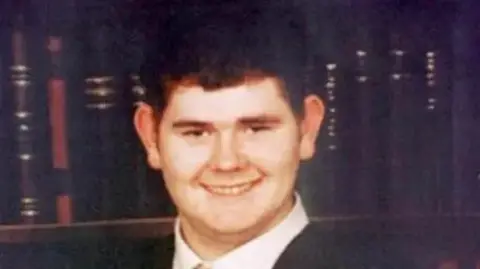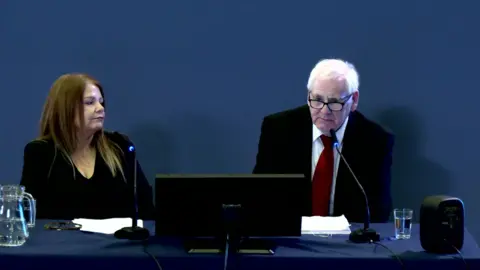Omagh bomb ‘declaration of war on civilian population’
Catherine Morrison
BBC News NI, in Omagh
 Family handout
Family handout
Aiden Gallagher was 21 when he was murdered by the Real IRA
The Omagh bombing was a declaration of war by the Real IRA on an unsuspecting civilian population for their own political aims, a man who lost his son in the explosion has told the public inquiry.
Michael Gallagher, whose 21-year-old son Aiden was killed, said while the group described themselves as “freedom fighters”, they were far from it.
He told the inquiry: “They are freedom takers, the victims have ended up being the freedom fighters.”
After a happy childhood with his parents, Michael and Patsy, and his two sisters, Aiden grew into a mature and motivated young man, a mechanic fascinated with cars and aircraft.
“He had a very wide group of friends and I’m very proud to say that we live in a country where there’s a lot of division and bigotry on both sides, but we never allowed that to penetrate our family,” Mr Gallagher told the inquiry.
“We chose our friends because of the contents of their heart, not because of their religion or their politics.”
The Real IRA bomb killed 29 people, including a woman who was pregnant with twins, on 15 August 1998 – four months after the signing of the 1998 Good Friday Agreement.
The Gallagher family had previously suffered in the Troubles. Michael Gallagher’s younger brother Hugh was murdered by the IRA in 1984.

Michael Gallagher at the inquiry, alongside his daughter Cat
Timeline of events
Mr Gallagher said the timing of the bombing was “absolutely cruel”.
“People often describe the Omagh bomb as the worst of the Troubles, it was actually the first atrocity of peacetime,” he said.
Aiden had gone in to Omagh town centre to buy a new pair of jeans. His father said his last words were: “I won’t be long.”
Michael Gallagher heard the blast and knew it was a bomb.
After several journeys into town, to the hospital, he was eventually taken to a makeshift morgue where he identified his son’s body.
His “greatest concern” driving home as dawn was breaking, was how he was going to tell his family that Aiden would not be coming home.
“That was extremely painful and difficult. In the end I didn’t really need to say anything.”
The husband of Omagh bomb victim Ann McCombe described her as a “wonderful and very, very caring person” during the inquiry.
“I suppose that is why I fell in love and married her. I think she was the kindest hearted person that I have ever known and she cared for everybody.”
Stanley McCombe and his son Clive were at a pipe band championship in Scotland when news of the explosion broke. Mr McCombe described their nightmare journey home.
“When we arrived home on the Sunday you could feel death in the air… It was a very strange feeling, everything was so still, you did not hear a dog barking or a car and there was nobody about, everybody had just disappeared.”
Clive McCombe said all of their lives changed after the bomb.
He said: “I miss my mother every day. I try as best as I can to live life in a way to make her proud. My mother would always say: “If you can be anything, be kind.”
Stanley McCombe also said in his statement that the aftermath of Dame Nuala O’Loan’s report where she found the Omagh bombing had been preventable, was “unbearable”.
“It became obvious to me and many of the families that we as victims were secondary.”
He said it had made him more “resolute” in his desire for a public inquiry.
#Omagh #bomb #declaration #war #civilian #population

